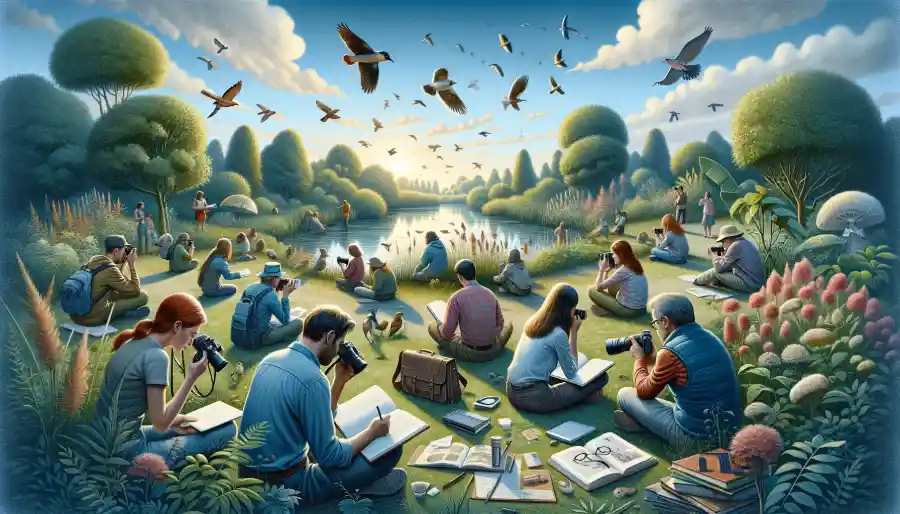Learn To Sit Back And Observe. Not Everything Need – Tymoff
Readers see questions on the internet “learn to sit back and observe. not everything need – tymoff” and this what will be the answer. I am here to guide you with importance, benefits and techniques.
First we are seeing the focus word in this question “learn to sit back and observe. not everything need – tymoff” and then will complete this question.
In the above question the focus word is “observe” and now we complete this question “learn to sit back and observe. not everything needs a reaction – tymoff”.
Let’s explore the importance of this practice, its benefits, and how we can integrate it into our daily lives for a more thoughtful, fulfilling existence.
Learn To Sit Back And Observe. Not Everything Needs A Reaction – Tymoff
Observation, often seen as a simple act, is foundational to various aspects of our personal and professional lives. It connects us more deeply with the present, sharpens our awareness, and fosters a mindful approach to life. Let’s delve into the significance of observation through its key components and benefits.
Importance of Observation

The significance of observation stretches far beyond mere sight; it’s a transformative practice that reshapes our engagement with the world. This underappreciated skill acts as a gateway to a more profound comprehension of our surroundings, interpersonal connections, and inner selves. Here’s a closer look at why observation holds such importance:
Importance of Being Present
Being present, a core aspect of observation, means fully immersing ourselves in the moment, engaging with our surroundings and experiences without distraction. This presence enhances our ability to notice subtle details, understand complex situations, and appreciate life’s nuances. It steers us away from the autopilot mode that dominates much of our daily lives, encouraging a richer, more engaged experience of the world.
Developing Awareness
Observation is a tool for developing a keen awareness of our environment. It trains us to notice what’s happening around us—the changes, the patterns, the dynamics. This awareness allows us to better navigate our social and physical environment, recognizing both opportunities and obstacles with greater clarity.
Cultivating Mindfulness
Observation is inherently linked to mindfulness—a state of active, open attention to the present. By observing, we engage in a form of mindfulness that calms the mind, reduces stress, and enhances our emotional and psychological well-being. This practice encourages us to appreciate the present moment without judgment, fostering a sense of peace and contentment.
Benefits of Observing
Let’s take a closer look at how observation can help us.

Enhancing Emotional Intelligence
Observation sharpens our emotional intelligence by improving our ability to understand and respond to our own emotions and those of others. By noticing the subtleties in people’s expressions and actions, we can better navigate social interactions, build stronger relationships, and create positive outcomes in our personal and professional lives.
Improving Problem-Solving Skills
The act of observing is critical for enhancing our problem-solving skills. By taking the time to observe and gather information before jumping to conclusions, we can approach problems more thoughtfully and develop more effective solutions. Observation allows us to see different angles of a problem, leading to more innovative and successful outcomes.
Enhancing Creativity
Finally, observation fuels creativity. By exposing ourselves to a variety of situations and actively observing, we collect a wealth of experiences and ideas that can inspire creativity. This exposure broadens our perspective, enabling us to think in new and unique ways. Creativity often stems from connecting disparate ideas, and observation is key to making these connections.
Techniques for Effective Observation

Effective observation is an essential skill across numerous fields, such as science, education, law enforcement, and daily life experiences. It entails much more than mere seeing; it involves understanding and interpreting the dynamics of our surroundings. Below are several strategies to improve your observation capabilities:
1. Active Engagement
- Be Present: Concentrate on the current moment, reducing distractions to a minimum. This means keeping electronic devices out of sight and fully immersing yourself in the environment or activity.
- Active Listening: Observation isn’t limited to visual stimuli; listening intently to sounds or dialogues around you can reveal significant insights not immediately visible.
2. Note Taking
- Detailed Notes: Record your observations as they occur. This can include descriptions of people, settings, behaviors, or recurring patterns.
- Diagrams and Sketches: Sometimes, drawing can capture aspects that words cannot fully convey. Focus on the essence of what you’re observing, regardless of your drawing skills.
3. Mindful Observation
- Mindfulness Practices: Using mindfulness can sharpen your observation skills by encouraging you to notice details without rushing to judge or analyze, which can obscure true understanding.
- Sensory Awareness: Employ all your senses when observing. This means not only relying on sight but also paying attention to sounds, smells, and tactile sensations.
4. Questioning and Curiosity
- Ask Questions: Consider the reasons behind certain actions or phenomena. What might be the underlying cause? Which details seem out of place? Asking questions enhances your comprehension.
- Curiosity: Let your natural curiosity guide your observation process. Pay special attention to things that stand out or pique your interest.
5. Comparison and Contrast
- Pattern Recognition: Spotting regular patterns or deviations is crucial for understanding behaviors or events.
- Compare and Contrast: Noticing differences and similarities can aid in grasping the core of your observations.
6. Use of Tools and Technology
- Observation Aids: Sometimes, using tools like binoculars, microscopes, or apps can reveal aspects not immediately apparent to the naked eye.
- Recording: Making audio or video recordings can capture nuances that might be overlooked in real-time, allowing for detailed analysis later.
7. Reflective Practice
- Reflect on Observations: Spend time thinking about what you observed, what caught you off guard, and what might have slipped past you.
- Discussion: Talking about your observations with others can offer fresh perspectives and insights you might not have considered on your own.
8. Practice and Patience
- Regular Practice: Observation skills, like any other, improve with consistent practice. Aim to make deliberate and thoughtful observation a part of your routine.
- Patience: Effective observation requires time and patience. Don’t rush; allow your observations to develop organically.
Incorporating these strategies into your routine can greatly improve your ability to observe, leading to richer insights and understanding in any area you apply them to.
Practical Applications

Observation skills significantly impact various facets of our lives, from deepening personal connections to refining workplace interactions and enriching everyday experiences. By adopting focused observation techniques, we can uncover deeper insights, build better understanding, and make informed decisions. Here’s how observation can be practically applied in key areas:
In Personal Relationships
Understanding Non-Verbal Cues
Observing body language, facial expressions, and other non-verbal signals can reveal much about a person’s real emotions or intentions, often more than words can convey. This leads to greater empathy and stronger bonds.
Active Listening
Observation isn’t just about what you see; listening closely to someone’s tone, pace, and voice inflections can provide clues about their feelings or sincerity, improving communication.
Conflict Resolution
By watching the dynamics of interactions, it’s possible to identify the true sources of disagreements or misunderstandings, facilitating effective solutions and compromises.
In Workplace Settings
Team Dynamics and Performance
Watching how team members interact can uncover issues affecting performance, such as communication gaps or a lack of collaboration. Addressing these observations can result in better teamwork and increased productivity.
Leadership Development
Leaders can observe to better understand the needs and motivations of their team, adjusting their approach to encourage growth, motivation, and engagement.
Innovation and Problem Solving
Watching workflows, processes, and customer interactions can pinpoint inefficiencies or areas needing improvement, driving innovation and creative solutions.
In Daily Life
Enhanced Learning
Observation facilitates learning from the environment and experiences, leading to personal development and the acquisition of new skills or knowledge. Watching skilled individuals in a particular hobby or craft can speed up your learning curve.
Safety and Awareness
By being observant of your surroundings and noting unusual behaviors or situations, you can improve your safety and that of others. This includes being mindful of potential hazards in public places or while traveling.
Mindfulness and Appreciation
Observation encourages mindfulness by drawing your attention to the details of the present moment, whether it’s the beauty of nature, the complexity of urban life, or the subtleties of art. This heightened awareness can lead to a greater appreciation of life’s intricacies.
Final Words – Learn To Sit Back And Observe. Not Everything Need – Tymoff
In a world where rapid reactions are the norm, learn to sit back and observe. not everything need – tymoff stands as a reminder of the power of thoughtful observation. This principle highlights the value of taking a step back to truly understand our surroundings, enhancing our relationships, work environment, and appreciation for the mundane.
Observation is an active process that encourages us to be present, listen deeply, and find strength in silence. It allows us to decode emotions, foresee unspoken needs, and unearth hidden opportunities for innovation and connection. Beyond practical benefits like improved emotional intelligence and creative problem-solving, observation offers the deeper reward of inner peace, providing a calm foundation from which to face life’s challenges.
By embracing observation techniques—actively engaging, taking notes, asking questions, and reflecting—we discover a richer way to experience life. This approach doesn’t ask for dramatic changes but a simple willingness to slow down and notice the world anew.
learn to sit back and observe. not everything needed a reaction – tymoff is more than advice; it’s a guide to a more mindful, fulfilling life. May your observant journey bring you insights, stronger connections, and a serene appreciation of the world’s beauty.
Did this article provide the insights you were looking for? If yes, we invite you to explore our website luxury trending magazine further for additional informative and engaging content.

